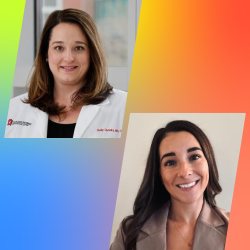In anticipation of the May 29 “Merck Journeys: Career Conversations within Clinical Research” virtual career event being held by Merck in partnership with ACRP, we asked Julia Buoscio, an Associate Clinical Research Associate based in the New York City area with the company, to share some details on her early-career progression since completing an internship with Merck and transitioning to a full-time position.
Buoscio will be joined by Merck representatives in Clinical Data Management, Clinical Science and Study Management, and Clinical Research Associate roles as they describe career options and opportunities at the company and industrywide employment trends in drug research and development during the event, which is free for ACRP members and nonmembers.
ACRP: Please tell us a little about what drew you into science in the first place, how you found your internship with Merck, what you thought of this introduction to clinical research, and your career growth into your current role since then.
Buoscio: I have always had an interest in science and medicine. While completing my undergraduate degree at Bucknell University, I was on the pre-med track, as I felt medical school would align most with my passions. After a few shadowing experiences and externship opportunities, I reconsidered whether this path was for me. I knew I had a passion for healthcare, but I was unsure what other career paths would satisfy that.
After doing extensive research online and searching for internship opportunities, I came across the Clinical Science & Study Management (CSSM) Internship position at Merck. I was unfamiliar with the field of clinical research prior to this but was beyond excited to discover a field that highlighted my passion for advancing medicine further to improve patient care. I applied and was accepted to this internship in the summer of 2021, and my internship experience reinforced my passion for the field. I applied for a full-time position as a Clinical Trial Coordinator and joined Merck in the summer of 2022. A year later, I began my current position as an Associate Clinical Research Associate (ACRA).
ACRP: What kinds of transferable skills have allowed you to grow and transition as new career opportunities have presented themselves?
Buoscio: I believe some important skills that can be applied to a variety of roles include project management, organization, and proactivity. However, I think the most valuable skills (especially for those early in their career) are the ability to recognize what you don’t know and to seek out that information by asking questions.
When I first started the ACRA role, I had a lot to learn. I had to learn all of Merck’s standard operating procedures and site processes, the complexity of each protocol I was working on, the various systems we were using (electronic data capture, electronic trial master file, vendor systems, etc.), and more. There was a point where I was hesitant to ask questions because I didn’t want to seem unprepared or that I was lacking information. However, I have learned that getting comfortable asking questions is a vital skill to recognize and develop in your career. I am grateful to be surrounded by such amazing colleagues who have been so open to hopping on a quick call with me or guiding me in the right direction of a resource when I didn’t know how to navigate a situation. The skill of “asking questions” has proven itself to be very valuable to me and has enabled me to grow and develop through my career.
ACRP: Have there been elements of the Merck culture, career development tools, or side opportunities within the company that have helped support your growth and development there?
Buoscio: My favorite part about Merck is that the company offers “Gigs,” which are opportunities that employees apply to and complete at the same time as their regular role. Gigs provide development experiences for employees to strengthen and grow skills or gain exposure to a new function/division/region that’s in alignment with their developmental goals or career aspirations. During my first year at Merck, I recognized certain skills outside the scope of my day-to-day job that I wanted to further develop, such as project management and leadership. I searched for Gigs on our “Opportunity Marketplace” and came across an event planning position through one of our Employee Business Resource Groups called “Next Gen Network” (NGN). I applied and interviewed for the position and was thrilled to be accepted.
In this Gig position, I managed and coordinated all event planning activities for a United States Regional Leadership Summit for about 50 NGN chapter leads across the U.S. and Canada. I consulted with the U.S. Leadership Team to determine objectives and requirements for the event; I managed the budget and booked all the venues, hotels, and activities for the group; I attended the meeting and facilitated workshops; and I conducted an after-action review post-summit and presented on lessons learned from the summit.
My Gig helped me develop transferable skills, enhance productivity with a high workload, become more efficient at multitasking, and even improve my confidence in my ability to learn new things. I am so grateful that Merck offers Gigs and provides employees the opportunity to enhance skills and capabilities through meaningful work beyond the scope of one’s typical role.
ACRP: Please share the top few pieces of advice you have for someone who is interested in exploring a clinical career at Merck.
Buoscio: My main piece of advice is to recognize the value of networking and learn to excel at it. I think the best way to learn more about clinical research and opportunities within the field is by talking to individuals already embedded in it—learning about their career path, hearing about their current role, and asking for any guidance they have to offer.
Before I joined the company, I connected with individuals on LinkedIn and asked if they were open to chatting briefly on a 1-on-1 Zoom/Teams call. Everyone offered their own unique perspective which allowed me to learn so much from these conversations. The people at Merck are truly what make the company so special, and I have found that everyone at the company has been very open to connecting to offer advice and guidance. I also think it’s beneficial to take advantage of resources offered online—ACRP offers some great courses that provide a thorough overview of clinical research and can prepare you for a variety of positions within the field.
Edited by Gary Cramer



